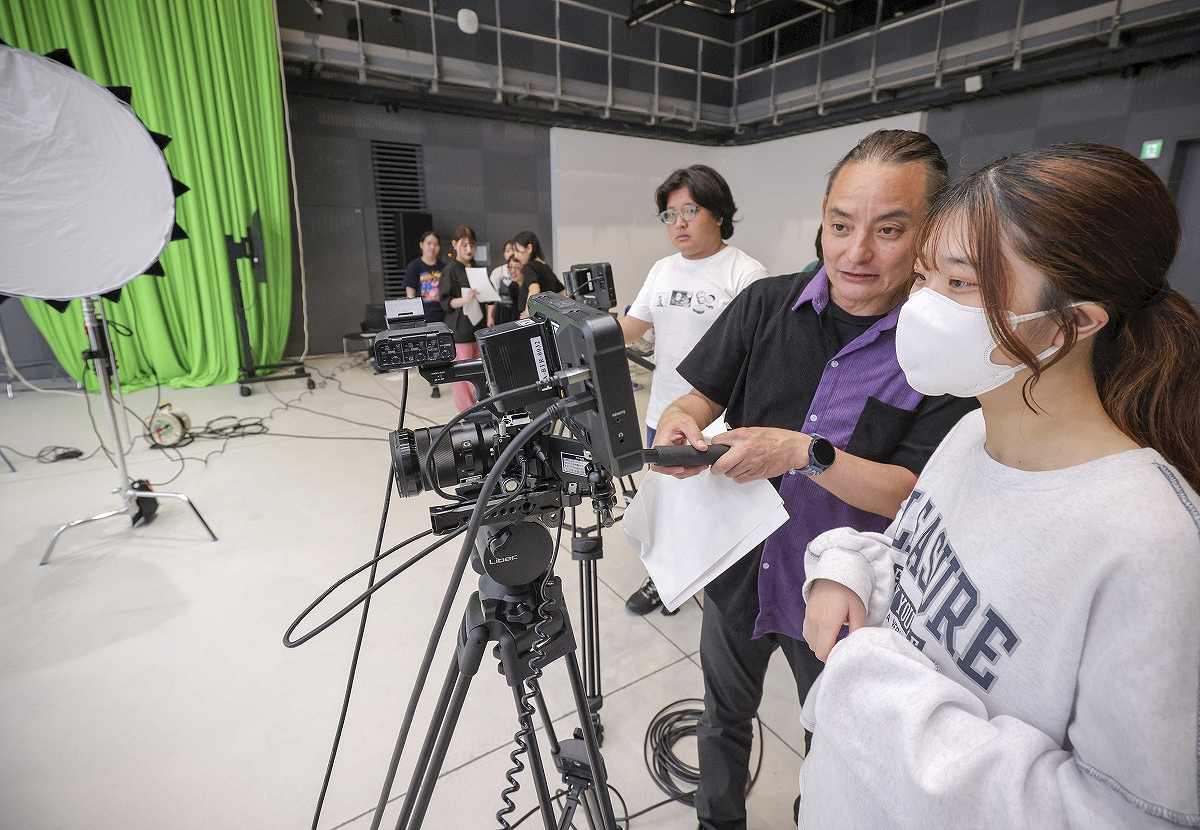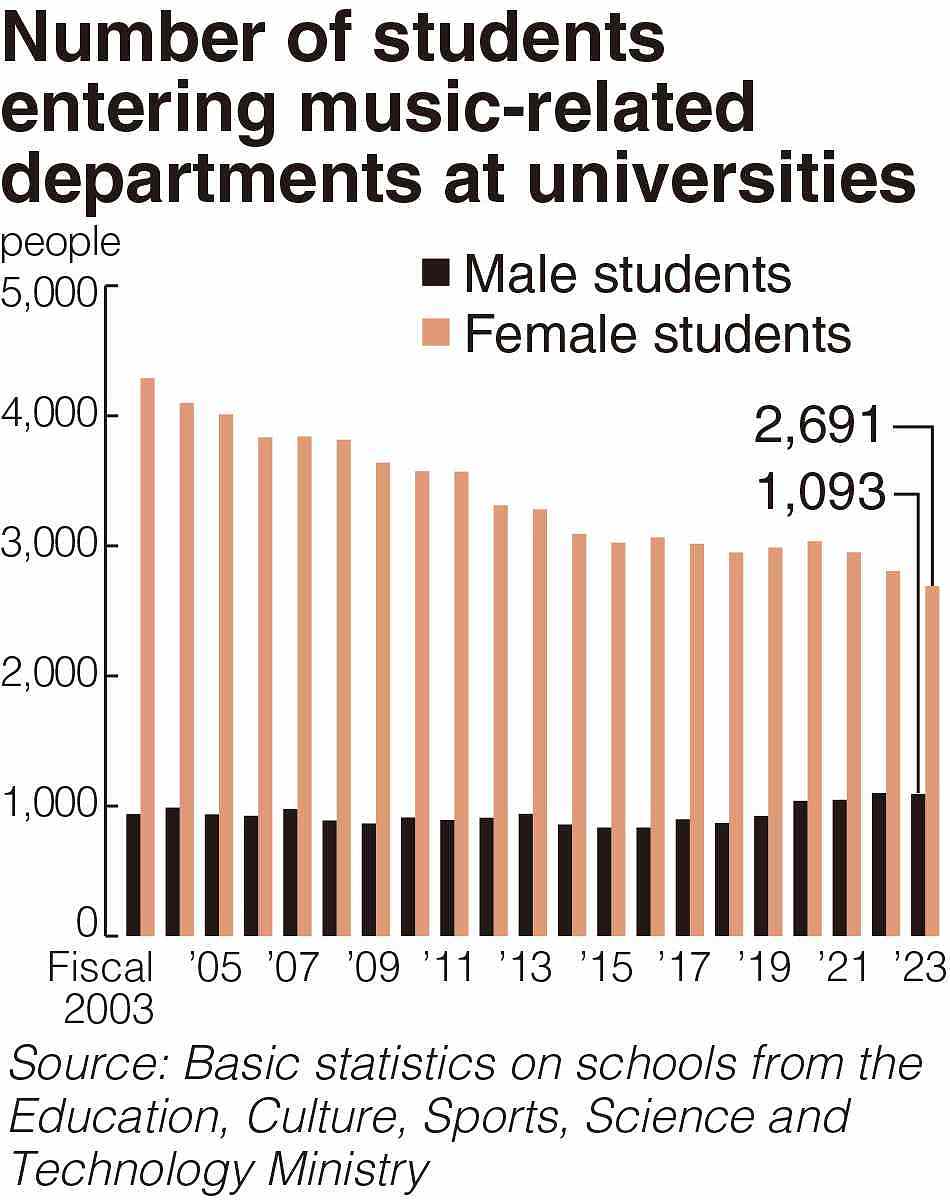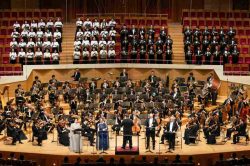Music Colleges, Universities Step Out of Tradition; Meeting Student Needs to Boost Recruitment

Students of the Senzoku Gakuen College of Music’s media arts course are engaged in filming a performance. Second from the right is Tsuyoshi Matsubara, a specially appointed professor at the college, who gives instructions to the students.
15:34 JST, August 1, 2024
From a voice actor course to computerized composition, music colleges and universities across the country are launching new courses and majors. Young people are increasingly refraining from majoring in music, which is causing the schools to adapt to the times. Educational institutions that offer higher education in music are trying to change their classical-music-only image and working hard to make a grand recovery to secure students.
Demand for video streaming
“Should the camera be closer?” asked a first-year student of the Senzoku Gakuen College of Music’s media arts course at the college’s studio in late May. A group of five students were filming other students. The group was assigned to work on the shoot by dividing the roles of director, camera and sound crew and others among themselves.
“Be careful that the shadow of the mic doesn’t get into the picture,” advised Tsuyoshi Matsubara, 59, a veteran TV commercial director and a specially appointed professor at the college.
The media arts course was launched in the college’s music department this fiscal year to teach students visual media production, including shooting, editing and recording, for four years. Thirty students enrolled in the course with aspirations to make their names in the TV and music industries amid increasing demand for live streaming and other visual media.
One of the students is Minori Yoshihara, 18, who has been interested in video editing since her junior high school days.
“The good thing about this course is that I don’t have to focus on one thing and can learn about a wide range of topics,” she said with a smile.
The Senzoku Gakuen College of Music opened in 1967. Although the college used to only teach subjects connected with classical music, such as those involving composition and musical instruments, there are now a wide variety of majors, such as the dance course and the voice actor / animation song course.
“Commercial music, like pop, is mainstream in the music scene, and the number of children taking piano lessons has dwindled. Therefore, we’re remodeling our college to meet the demands of the times,” said Prof. Akio Shimizu, assistant director of the college’s music department.
Not enough students
As things currently stand, the college can no longer attract enough students if it continues to only teach classical music.
Of the 11 private universities and colleges which have a single department mainly teaching music, seven did not have enough applicants in fiscal 2023. Ueno Gakuen University, the alma mater of world-famous pianist Nobuyuki Tsujii, stopped recruiting new students from fiscal 2021. The college is now in the process of closing down.
“Only around one in 100 students can make their living as a professional musician right after graduation,” said Prof. Takao Ouchi of Nagoya University of the Arts, who is well-versed in the management of music colleges. “In recent years, more and more female students say they want to get a job and become independent, so they are shying away from education meant to nurture instrumentalists.”
According to the Education, Culture, Sports, Science and Technology Ministry’s basic statistics on schools, 3,784 students enrolled in music-related courses at universities and colleges in fiscal 2023, a decline of about 30% compared to 20 years ago. Among female students, the decline rate was about 40%.
“Starting a new course is a survival method for universities and colleges that realize the need for education with an eye on what students can do after graduation, such as finding employment or starting a business,” Ouchi said.

Job hunting support
Some universities have begun increasing placement support for students.
Showa University of Music in Kanagawa Prefecture has a course that helps students become aware of the advantages granted by music university studies through group discussions and has also developed an industry study course in conjunction with a placement service company.
A breakdown of jobs taken by those who graduated from the university in March 2023 shows 15% for music performance or theater, 15% for teaching or other education-related work and 42% working for companies.
“There are many students who cannot envision a path other than being an instrumentalist,” said Hideyuki Matsushima, 56, of the university’s placement support room. “We need to widen their perspectives by suggesting other paths, such as a company employee or a teacher.”
Private-sector placement support services, which exclusively help students of music colleges and universities, are popular. Sayuri Shiratori, 35, who graduated from a music college, now runs Musicari, a company that introduces students majoring in music to companies. Musicari conducts free placement activity seminars and other support for students who register with the company.
According to Shiratori, the number of students majoring in music who are thinking of working at a company has increased since the COVID-19 pandemic, when many students saw musicians who graduated before them losing their jobs.
“Music majors don’t shy away from making extensive efforts and are ready to work enthusiastically, so they are highly appreciated by companies,” she said. “I want to reduce the number of high school students who give up on majoring in music due to fear of the future.”
High barriers for pro artists
The barriers to entry for those aspiring to become professional instrumentalists are high.
According to the Association of Japanese Symphony Orchestras, 40 professional Japanese orchestras currently hold membership with the association. The number of musicians belonging to those orchestras was just 2,353 in fiscal 2022.
Unlike most companies, orchestras do not regularly hire new members. They audition new members only when there are vacancies for certain instruments, which is one of the reasons it is so difficult to find a job with a professional orchestra.
There are also many people who, after graduating from music colleges or universities, chase their dreams of becoming a professional musician by studying overseas or gaining experiences as an extra in an orchestra.
Top Articles in Culture
-

BTS to Hold Comeback Concert in Seoul on March 21; Popular Boy Band Releases New Album to Signal Return
-

Director Naomi Kawase’s New Film Explores Heart Transplants in Japan, Production Involved Real Patients, Families
-

Tokyo Exhibition Offers Inside Look at Impressionism; 70 of 100 Works on ‘Interiors’ by Monet, Others on Loan from Paris
-

Traditional Japanese Silk Hakama Tradition Preserved by Sole Weaver in Sendai
-

Exhibition Featuring Yoshiharu Tsuge’s Manga World Underway in Chofu, Tokyo; Unique, Surreal Works Draw Steady Crowds
JN ACCESS RANKING
-

Producer Behind Pop Group XG Arrested for Cocaine Possession
-

Japan PM Takaichi’s Cabinet Resigns en Masse
-

Man Infected with Measles Reportedly Dined at Restaurant in Tokyo Station
-

Israeli Ambassador to Japan Speaks about Japan’s Role in the Reconstruction of Gaza
-

Videos Plagiarized, Reposted with False Subtitles Claiming ‘Ryukyu Belongs to China’; Anti-China False Information Also Posted in Japan






















